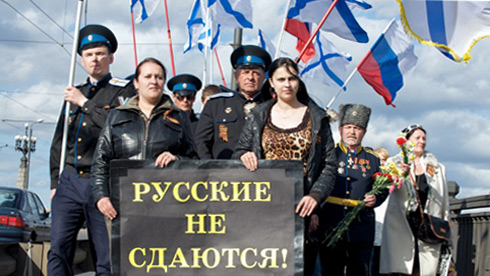No one could accuse Vladimir Linderman of a lack of ideas or enthusiasm. Not so long ago, he triggered a heated debate with his idea for a referendum to recognise Russian as Latvia’s official second language. The failure of the referendum came as no surprise, but Linderman has now moved on to other preoccupations. In particular, he is focusing on the issue of Latvia’s “non-citizens”.
Linderman is campaigning for these “aliens”, most of whom are of Russian nationality but deprived of Latvian or other citizenship, to be automatically granted Latvian passports. [Latvia distinguishes between citizenship and nationality. Citizenship is defined as belonging to a country. However, nationality is determined solely on the basis of ethnic criteria].
Although the Kremlin is upset about the allegedly deplorable situation of stateless Russians, the majority of non-citizens tend not to want to change anything.
Marina Afanasenko, age 51, works as a street sweeper. Caught in the path of her broom, scraps of torn election posters are there to remind her that Riga will shortly be holding municipal elections [on June 1]. But for Marina, who is not entitled to vote, they are just meaningless pieces of paper.
No political voice
“For my husband and I, the election campaigns are like a huge TV show. In front of the television every evening, we get to see who has been elected, or who has joined the coalition. But for 20 years, we have had no influence on this process,” she sighs.
Marina is one of Latvia’s 300,000 non-citizens. “It is all because I was not born to the right family,” she explains. Her Russian parents emigrated to Soviet-occupied Latvia in 1947 and 1952. When independence was restored, only people who were Latvian citizens before June 17, 1940, the date when the Soviet occupation began, were recognised as citizens. And the same rule automatically applied to their descendants.
“I can see some logic in denying citizenship to my parents who were immigrants. But as for my children and myself, we were born in Latvia. We are not responsible for what happened before we were born,” argues Mrs Afanasenko.
The granting of citizenship is conditional on passing a written language and history test. However, that does not mean that by learning Latvian, Marina would be able to solve all of her problems, because she is unwilling to acknowledge that the Soviet Union occupied Latvia, which is the correct answer on the history test. “I really think there was no occupation. Latvia voluntarily joined the Soviet Union. Why should I be forced to lie,” she insists.
Kristine is a dark-haired Russian speaker in her 30s. Unlike Marina, she is hardly worried about the question of occupation and whether or not it took place. She has just left the premises of the Latvian naturalisation office where she sat the history test.
Travel freedoms
“I got it,” she announces exultantly. In three or four months, she will return here to exchange her purple stateless passport for a blue Latvian one. However, Kristine is largely unconcerned about the colour of her identity papers. “I am planning to move to Great Britain soon, and as a Latvian citizen, I will not face any obstacles.” She is very much typical of the type of non-citizen who passes the exam in Latvia.
“The number of applications for naturalisation increases when advantages associated with Latvian citizenship become apparent. For example, in 2005 [a year after the country joined the EU], approximately 20,000 non-citizens applied for naturalisation. Three years later, and in the wake of decisions by the Commonwealth of Independent States and later Russia to exempt non-citizens from a requirement to obtain visas, the number of applications has declined dramatically,” explains the manager of the Latvian naturalisation office. Barely more than 2,000 people now apply for naturalisation every year.
Alternative elections
One of the new ideas from the groups that support non-citizens is alternative elections. “The congress of non-citizens” is planing to organise a vote this year, to coincide with official local elections in Latvia. The goal of the initiative is to create a “parliament” to take charge of the rights of non-citizens.
“Anyone from an EU country who has lived in Latvia for at least a year can vote and even stand for election. I, however, cannot, even though I was born here and have lived here all my life,” affirms Vladimir Linderman.
It is hard to believe that this friendly man who speaks such good Latvian is the same person who threatened to blow himself up in the tower of Saint Peter’s Church in 2001, when the “Russian Bolsheviks” were on trial in Latvia.
“I have decided to apply for Russian citizenship,” he announces. While Marina adds: “Russia is offering retirement at age 55, whereas in Latvia, you have to wait until you are 65." However, one question remains: is Russia willing to welcome her?
Was this article useful? If so we are delighted!
It is freely available because we believe that the right to free and independent information is essential for democracy. But this right is not guaranteed forever, and independence comes at a cost. We need your support in order to continue publishing independent, multilingual news for all Europeans.
Discover our subscription offers and their exclusive benefits and become a member of our community now!












